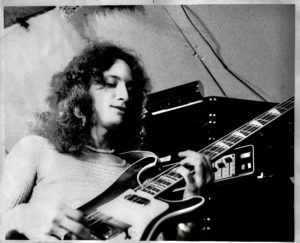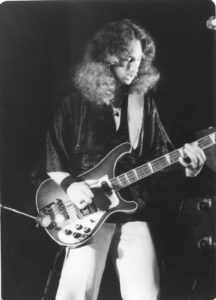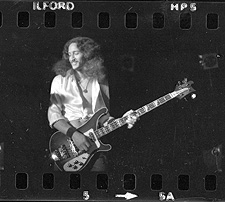Pentwater’s Ron LeSaar
Here’s a profile of US Prog band Pentwater’s Ron LeSaar, bassist and songwriter who talks about Pentwater’s creative process and his musical influences.
“An incredible experience”
by Ron LeSaar (Oldest member of the group)
Few people will get to experience the thrills and sensations that come with being in a successful rock band. It’s a dream that many aspire to, or fantasize about, but the reality is that a very select group ever gets to ride that “E” ticket roller coaster.

Some 25 years ago, Pentwater came as close to the “big show” as a group could get without a major label contract or an MTV video. I’ve never regretted a minute of it since. You can’t buy that kind of life-experience or camaraderie. It was life altering; it was the most fun you could have with or without drugs, and I’m proud to have run with this bunch of guys. In a lot of ways, the group became a second family for many of us.
Pentwater strove to be in the big leagues from day one. We had to have lights and stage-sets like the top acts of the day… flash-pots, fog and special effects… we believed that if we presented a top show, a wild experience – it would carry us to the top of the charts… and we were just 15 years old. We never set out to be a “bar-band,” doing cover songs like so many groups did around the Chicago area, (and making a pretty good living at it, I suppose). We always had higher ideals. When we weren’t playing gigs, the rehearsal schedule was five nights a week! And when we were at home, guitars and keys were always being played. Typewriters were churning out lyrics and poems.

Everyone was expected to contribute with songs, lyrics, riffs, sounds, staging, management, logistics; all the myriad details that it takes to keep a musical circus on the road, on stage, and in the studio – happy, healthy, inspired, and full of exploration and discovery.
While our music is generally categorized as “Progressive,” you can’t listen to Pentwater without mining nuggets of so many other influences. Six musicians, each with their own coveted stash of LPs and tapes, wearing out the grooves (or oxides) of their separate rock visionaries… we came to the table with diverse backgrounds, and yet, it all gelled. It all made sense because we made it our own style. There are classical lines next to boogie, majestic love stories next to biting satire, and hard rock brushing up against angelic harmonies. The reviews held constant on that topic: we were very hard to pigeonhole into a specific genre. Progressive die-hards will find what they’re looking for, but so will audiophiles who admit to owning a much wider library of sounds.
Pentwater’s Ron LeSaar
The experimentation of sound is very much at the root of our music. You can hear it in our mixes and even in our live shows. Sure, there were great sounds out there, ready to emulate from the records of the day, but we always asked, “What if we filtered this or tweaked that? Let’s try this instead… What if… What if…?” Many days, we would begin rehearsals with a sound “wave”… an audio experiment into unknown territory… a chance to take musical risks or push the envelope of playing skills. Parts of these waves were eventually developed and became the basis of songs.
My influences were varied as well. Before Pentwater, I played in several garage bands in the Chicago area. Catfish played the blues; we played the original blues like Willie Dixon, T-bone Walker, Sonny Boy Williamson, Muddy Waters, and Lil’ Walter. The 12-bar bass lines were just the ticket for a beginner! In Cranberry Rose, we started writing more originals along with heavies of the day: Cream, Hendrix, Humble Pie, Sabbath, and Ten Years After. The music became slightly more complicated (and much louder!). Now I had to play bass and sing! The folk-rock era was captured in Eclipse where Cat Stevens, Mason Profit, CSN&Y, and Joni Mitchell kept us all entertained. I learned harmony and dynamics from this softer rock side. Later, in the Toasters, playing all original songs, I picked up more writing and arranging skills to use with Pentwater.

I’d have to list Jack Bruce, Tony Levin, and Chris Squire as my major bass influences. They’re all separately well-known for putting the bass up front as a lead and rhythm instrument. As for today, my pallet continues to expand. I explore the sounds of Philip Glass, Ultravox, “The Thin Red Line” (soundtrack), Prodigy, Duke Ellington, David Bowie, Brian Auger, the Dixie Dregs, and St. Seines. A pretty diverse group, yes?
1 thought on “Pentwater’s Ron LeSaar”